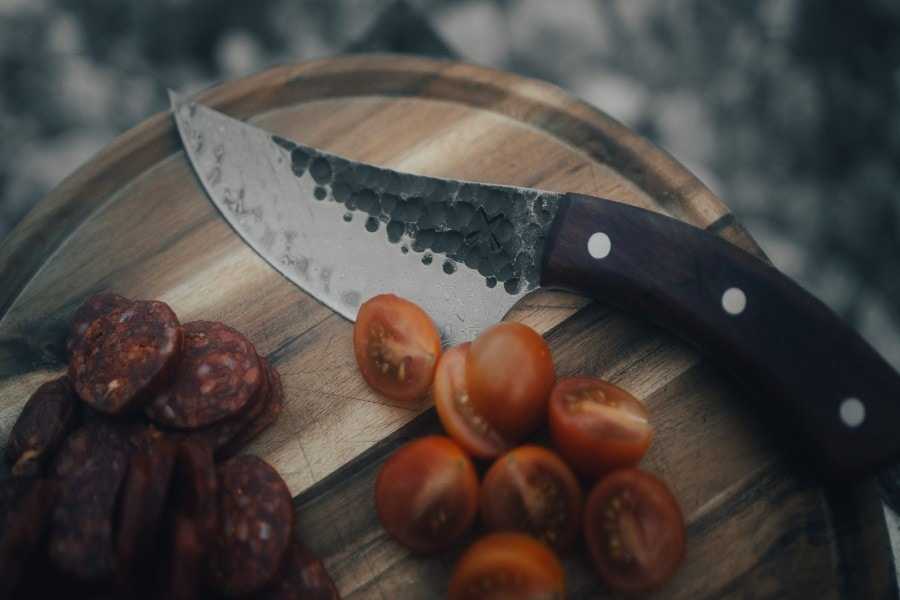To keep your Damascus steel kitchen knife sparkling and sharp, a simple cleaning routine involving gentle washing with mild soap and thorough drying is essential. Regular maintenance prevents rust and preserves its stunning pattern. For stubborn stains or rust, lightly scrubbing with baking soda or using mineral oil can work wonders.
Keep your Damascus steel knife flawless by avoiding harsh abrasives and dishwasher cleaning. Instead, hand wash immediately after use with warm water and a soft sponge, dry thoroughly, and occasionally apply a light coat of mineral oil to protect the blade and maintain its beauty.
Your Damascus steel kitchen knife is a prized possession, and caring for it properly ensures it remains an elegant and reliable tool for years to come. Its unique layered pattern not only adds visual appeal but also requires gentle handling to prevent damage. Because of its delicate nature, proper cleaning involves simple steps like hand washing, avoiding harsh chemicals, and keeping it dry and oiled. This way, your knife stays rust-free, sharp, and strikingly beautiful, ready to handle any culinary challenge with ease.
How to Clean Damascus Steel Kitchen Knife
Cleaning a Damascus steel kitchen knife requires care to preserve its sharpness and unique pattern. Proper cleaning not only keeps the knife looking beautiful but also extends its lifespan. In this section, we will cover **step-by-step methods** and **tips** to ensure your Damascus steel knife stays in top condition.
Understanding Damascus Steel: Why Cleaning Matters
Damascus steel is known for its distinctive wavy patterns and layered construction. These layers are made of different types of steel, which can react differently to cleaning agents. Proper cleaning removes food residues and prevents corrosion, maintaining the knife’s durability.
Basic Tools Needed for Cleaning
Before you start cleaning, gather the following:
- Soft cloth or microfiber towel
- Warm water
- Gentle dish soap
- Non-abrasive sponge or brush
- Cleaning oil (such as mineral oil)
- Knife guard or sheath for storage
Using the right tools helps protect the knife’s surface and pattern.
Step-by-Step Guide to Cleaning Your Damascus Steel Knife
1. Rinse Immediately After Use
Always rinse your knife right after cutting to prevent food from drying onto the blade. Use warm water to remove loose particles and prevent staining.
2. Apply Gentle Dish Soap
Add a few drops of mild dish soap onto a soft sponge or cloth. Gently clean the blade’s surface, avoiding abrasive scrubbers that can scratch the pattern.
3. Focus on the Edge and Crevices
Pay attention to the edge and any grooves or intricate patterns. Use a soft brush if needed to reach tight spots without damaging the surface.
4. Rinse Thoroughly
Wash away all soap residues with warm water. Soap can dull the blade’s finish if left on the surface.
5. Dry Completely
Use a clean, dry microfiber cloth to thoroughly dry the blade. Moisture left on the surface can lead to rust or discoloration.
Deep Cleaning Techniques for Damascus Steel
Using Baking Soda Paste
Create a paste with baking soda and water. Gently rub the paste on the blade with a soft cloth to remove any stubborn stains or discoloration. Rinse thoroughly and dry completely afterward.
Removing Rust and Stains
If your knife develops rust spots, use a small amount of mineral oil or specialized rust remover. Gently scrub with a soft brush or fine steel wool, then rinse and dry.
Polishing Your Damascus Steel Knife
Regular polishing restores the shine and pattern visibility. Use a dedicated knife polish or mineral oil and a soft cloth. Apply a small amount and buff until the surface gleams.
How to Maintain Your Damascus Steel Knife
Proper maintenance is essential for keeping your knife in great shape. Store it in a knife guard or sheath to prevent scratches. Avoid washing in a dishwasher, as the heat and detergent can damage the steel. Regularly oil the blade to prevent corrosion and preserve the pattern.
Tips for Preserving the Pattern and Sharpness
– Always clean with soft materials to avoid scratching the surface.
– Dry thoroughly after each wash to prevent rust.
– Use cutting boards made of wood or plastic to avoid dulling the blade.
– Hone the blade regularly with a whetstone or honing rod to maintain sharpness.
– Reapply a thin coat of food-safe oil periodically, especially if you notice dullness or rust spots.
Additional Tips for Special Cases
Removing Water Spots and Discoloration
Light water spots or discoloration can be cleaned with a mixture of lemon juice and baking soda. Apply gently, then rinse and dry immediately.
Maintaining the Pattern Visibility
To keep Damascus patterns vivid, avoid harsh chemicals and abrasive cleaning tools. Regular light polishing enhances the pattern and keeps it sharp.
Storage Options to Protect Your Knife
Store your knife in a knife block, sheath, or on a magnetic strip. Proper storage prevents accidental scratches and exposure to moisture.
Caring for your Damascus steel kitchen knife involves gentle cleaning processes, proper storage, and regular maintenance. Using the right tools and techniques helps retain its beauty, sharpness, and durability. By following these steps, you’ll enjoy a beautifully patterned, high-performing knife for years to come.
How to clean your Damascus steel knife @HexClad
Frequently Asked Questions
What is the best way to remove stains from a Damascus steel kitchen knife?
To remove stains, create a mixture of baking soda and water to form a paste. Gently scrub the stained areas with a soft cloth or sponge dipped in the paste. Rinse thoroughly with warm water and dry immediately with a clean towel to prevent new stains from forming.
How can I prevent rust from developing on my Damascus steel knife?
Keep your knife dry after each use by wiping it with a soft cloth. Occasionally apply a light coat of mineral oil or specialized knife oil to protect the blade from moisture. Avoid dishwasher cleaning, as harsh detergents and prolonged water exposure can cause rust.
What is the proper way to polish a Damascus steel knife without damaging its pattern?
Use a dedicated knife polish or a gentle metal polish formulated for Damascus steel. Apply a small amount to a soft cloth and gently polish the surface, following the pattern lines. Avoid abrasive materials that could scratch or dull the intricate design of the blade.
How often should I deep clean my Damascus steel kitchen knife?
Deep cleaning should happen after every few uses or if you notice buildup or stains. Remove any debris, polish the blade, and check for signs of rust or corrosion. Regular cleaning helps maintain the knife’s appearance and performance over time.
What cleaning products should I avoid on Damascus steel knives?
Avoid using acidic or bleach-based cleaners, as they can corrode the steel. Steer clear of abrasive scrubbers or steel wool that can scratch the surface. Stick to mild detergents and soft cloths to preserve the blade’s pattern and integrity.
Final Thoughts
To clean a Damascus steel kitchen knife, start by washing it with warm water and a mild detergent. Use a soft cloth or sponge to gently remove food particles and dirt. Rinse thoroughly and dry immediately with a dry cloth to prevent rust.
For deeper cleaning, occasionally apply a light coat of mineral oil to maintain the blade’s luster and prevent corrosion. Remember, how to clean damascus steel kitchen knife must be done carefully to preserve its pattern and integrity. Proper maintenance ensures your knife remains sharp and beautiful over time.
As an Amazon Associate, We earn from qualifying purchases. When you purchase a product through Amazon links on kitchenadvising.com, we may earn a small commission at no extra cost to you. This helps support the site and keep our content free.


